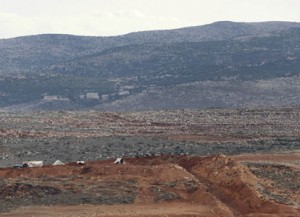Special to WorldTribune.com
LONDON — Syria has been urged to stop laying anti-personnel mines
along the border with Lebanon.
The organization that monitors the Anti-Personnel Mine Ban Convention
called on the regime of Syrian President Bashar Assad to end the laying of
mines along its 200 kilometer border with Lebanon. Several people have
already been killed or injured from the Syrian mines.

“We call on Syria to stop laying landmines and remove these
indiscriminate weapons,” Gazmend Turdiu, responsible for monitoring the treaty, called the Ottawa Convention, said.
Turdiu, secretary-general of the Albanian Foreign Ministry, cited reports that the Syrian military was planting mines in an area that faces the Lebanese border villages of Knayseh and Al Hanayder.
“Children are particularly vulnerable to these weapons,” Turdiu said on Nov. 7. “They are far more likely to die from the resulting injuries.”
The Anti-Personnel Mine Ban Convention bans the use, production or transfer of such mines. Neither Lebanon nor Syria has signed the convention, launched in 1997.
“Neither Syria nor Lebanon have acceded to the Ottawa Convention, which
sees that states accept that they shall never, under any circumstances, use
anti-personnel mines, and shall provide assistance for the care and
rehabilitation, including the social and economic reintegration, of landmine
victims,” the convention said in a statement.
Western diplomats said Syria began planting the mines in September
to stop the flow of soldiers fleeing for Lebanon. Several thousand Syrians,
many of them defecting soldiers and police, have found haven in Lebanon.
Syrian businessmen were also said to have smuggled financial assets to
Lebanon.
“With a few exceptions, the international community has accepted that
the insidious, indiscriminate nature of anti-personnel mines means they must
be eradicated,” Turdiu said. “We should all be deeply concerned.”

You must be logged in to post a comment Login